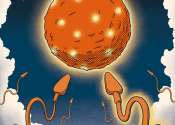Study identifies epigenetic 'switches' that regulate the developmental trajectories of single cells
Individual cells in the human body develop progressively over time, ultimately becoming specialized in specific functions. This process, known as cell differentiation or specialization, is central to the formation of distinct ...









